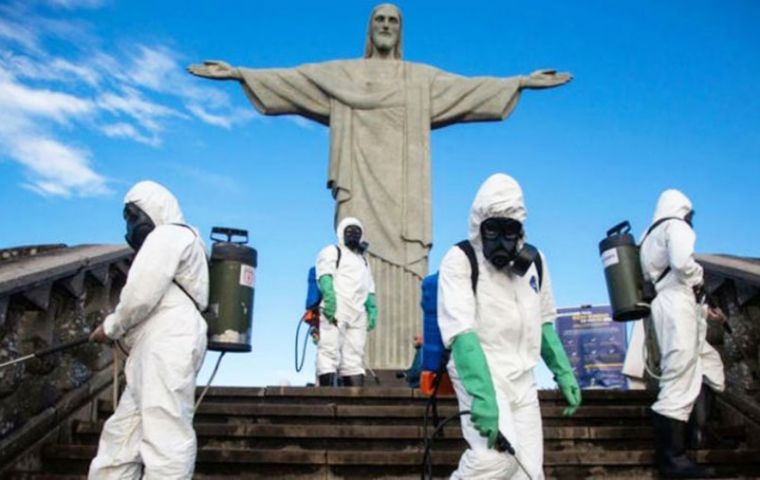MercoPress. South Atlantic News Agency
Anti-covid measures lightened in Rio de Janeiro
 Scientists had recommended more extreme measures because they considered it is too early to notice any progress. (Pic EFE)
Scientists had recommended more extreme measures because they considered it is too early to notice any progress. (Pic EFE) Starting this Friday, restrictive measures imposed a week ago as a part of the local authorities in the Brazilian state of Rio de Janeiro's strategy against the spread of the coronavirus pandemic are to be lightened, it was announced.
Bars, restaurants and candy stores will welcome customers in person again for on-site consumption but only until 9pm. Other businesses will have to stick to specific hours as indicated by the government, while non-essential state offices will operate from 8 am to 5 pm. Museums, galleries, cinemas, circuses, aquariums and zoos are allowed between noon and 9pm. But beachgoing will be restricted to local residents until April 19.
A curfew from 11pm to 5am will remain in force, while social gatherings will still be banned.
Researchers from the Covid-19 Observatory of the Oswaldo Cruz Foundation (Fiocruz) issued a statement recommending the extension of social distancing, because they found it was still too early for any relaxation. “Although the data suggest that there was an increase in social distancing as a consequence of the increase in restrictive measures, the mitigating effect on the advance of the pandemic was timid,” the scientists said, adding it would take at least 14 days for the effects of the restrictions can be perceived.
Rio has recorded 38,657 deaths and 671,207 SARS-CoV-2 infections out of Brazil's total 345,025 deaths and 13,279,857 cases.
Meanwhile, the Federal Supreme Court ruled Thursday by nine votes to two that states and municipalities can determine the public veto of religious activities as a measure to combat covid-19, thus upholding a decree by the São Paulo state government that limited ceremonies, services and face-to-face worship in the so-called emergency phase, in force since March 15. The judges maintained that the temporary restriction does not harm the constitutional precept of religious freedom.
Justice Carmen Lúcia stressed the limitations were “temporary, necessary and reasonable,” while Chief Justice Luiz Fux went even farther: “It is a moment of deference to science,” he said




Top Comments
Disclaimer & comment rulesCommenting for this story is now closed.
If you have a Facebook account, become a fan and comment on our Facebook Page!